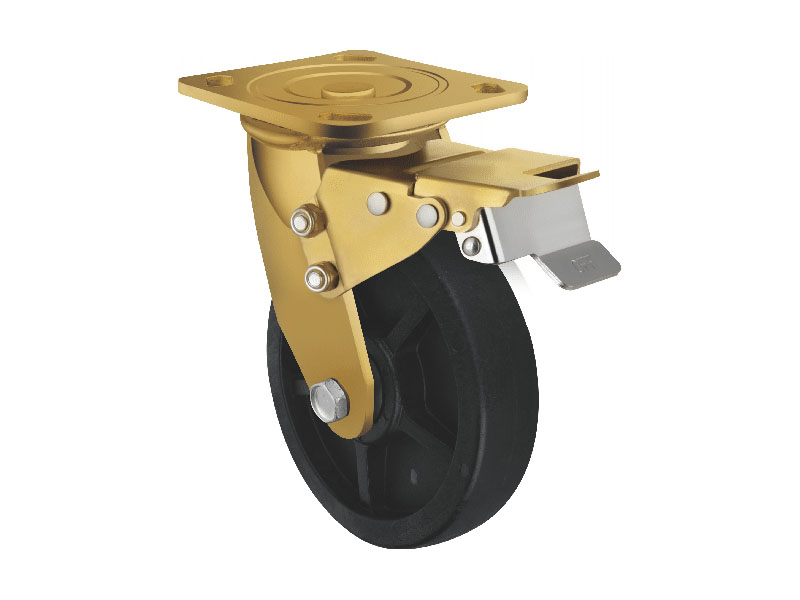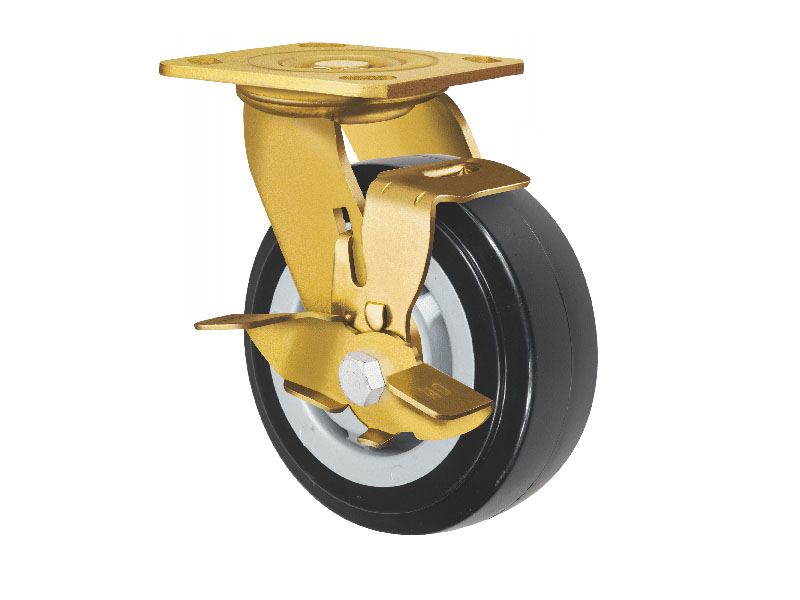Choosing the Right Low Profile Heavy Duty Caster Wheels: A Comprehensive Guide
Introduction of Low Profile Heavy Duty Caster Wheels
Low Profile Heavy Duty Caster Wheels are essential tools for moving heavy loads in tight spaces. These specialized wheels are designed to handle significant weight while maintaining a compact form factor, making them perfect for a variety of industrial and commercial applications. Whether you’re in manufacturing, warehousing, or any other industry that requires heavy lifting and moving, choosing the right caster wheels is crucial for efficiency, safety, and longevity.
Understanding Your Load Capacity Needs
Assessing Maximum Load Weight
The first step in selecting Low Profile Heavy Duty Caster Wheels is to determine the maximum weight you need to move. This includes not only the items themselves but also the weight of the cart, rack, or equipment that will be fitted with the casters. Accurate assessment is crucial to ensure safety and prevent damage to the wheels.
Distributing the Load by using Low Profile Heavy Duty Caster Wheels
Consider how the load will be distributed across the wheels. If you’re using a cart with four wheels, the weight will be divided among them. However, uneven distribution or sudden shifts in weight can put extra strain on individual wheels. To account for this, select wheels with a higher load capacity than the average weight per wheel.
Evaluating Your Operating Environment
Floor Surfaces
The condition and type of floor surfaces in your workspace will impact the performance and longevity of your caster wheels. Different materials and designs are better suited to specific conditions.
Smooth Floors: Polyurethane or rubber wheels are ideal for smooth surfaces like concrete or tile. They protect the floor from scratches and roll quietly.
Rough or Uneven Floors: Steel or hard rubber wheels are more durable and can handle rough terrain without deforming.
Carpeted Areas: Larger diameter wheels roll more easily over carpet fibers, reducing effort and minimizing damage.
Temperature and Humidity
Temperature and humidity levels can also affect the performance of caster wheels.
High-Temperature Environments: Phenolic and steel wheels are suitable for high-temperature applications, such as near ovens or kilns.
Humid or Wet Conditions: Polyurethane, stainless steel, and certain types of rubber resist water and chemicals, making them ideal for wet environments.
Chemical Exposure
If your workspace involves exposure to chemicals, choose wheels made from materials that can withstand chemical contact without deteriorating.
Chemical Resistance: Polyurethane, phenolic, and certain types of rubber offer good resistance to oils, greases, and solvents.
Specialized Coatings: In highly corrosive environments, consider wheels with specialized coatings for additional protection.
Exploring Different Materials
Polyurethane
Polyurethane wheels are versatile and durable, offering several key advantages:
Floor Protection: Soft and flexible, polyurethane wheels protect floor surfaces from damage.
Load Capacity: They can handle significant weight, making them suitable for heavy-duty applications.
Noise Reduction: Polyurethane wheels are relatively quiet, which is beneficial in environments where noise levels need to be kept low.
Chemical Resistance: Polyurethane resists a variety of chemicals, making it suitable for industrial environments.
Rubber
Rubber wheels are another popular choice, offering several benefits:
Shock Absorption: Rubber’s elasticity absorbs shocks and vibrations, protecting the load and equipment.
Traction: Rubber wheels provide excellent traction, preventing slipping on wet or slippery surfaces.
Floor Protection: Rubber is gentle on floor surfaces, reducing the risk of scratches and damage.
Durability: Rubber wheels are highly durable and resistant to wear and tear.
Steel
Steel wheels are ideal for the most demanding applications:
Strength and Durability: Steel wheels are incredibly strong and durable, handling heavy loads and resisting deformation.
Impact Resistance: They are highly resistant to impacts and shocks, protecting both the wheels and the load.
Chemical Resistance: Steel wheels resist a variety of chemicals, but stainless steel is better in highly corrosive environments.
Noise Levels: Steel wheels can be noisy, so consider this if noise levels are a concern.
Phenolic
Phenolic wheels are another durable option:
Impact Resistance: Phenolic wheels resist impacts and shocks, making them suitable for heavy-duty applications.
Load Capacity: They can handle significant weight and offer long-lasting performance.
Chemical Resistance: Phenolic wheels resist a variety of chemicals, making them suitable for industrial environments.
Floor Protection: Phenolic wheels are gentle on floor surfaces, reducing the risk of damage.
Nylon
Nylon wheels are also a good choice for heavy-duty applications:
Load Capacity: Nylon wheels can handle significant weight and offer long-lasting performance.
Impact Resistance: They resist impacts and shocks, protecting the load and equipment.
Chemical Resistance: Nylon wheels resist a variety of chemicals, making them suitable for industrial environments.
Noise Levels: Nylon wheels are relatively quiet, reducing noise levels in the workplace.
Considering Additional Features
Brakes and Locks
Safety is paramount when moving heavy loads. Brakes and locks are essential features to consider:
Brakes: Brakes stop the wheels from rolling when needed, preventing accidents and damage.
Locks: Locks secure the wheels in place when not in use, preventing them from rolling around and causing hazards.
Swivel and Rigid Casters
Caster wheels come in two main types: swivel and rigid. Each type has its own advantages:
Swivel Casters: Swivel casters can rotate 360 degrees, providing excellent maneuverability. They are ideal for applications where you need to move the load in tight spaces or change direction frequently.
Rigid Casters: Rigid casters move in a straight line, providing stability and support. They are ideal for applications where you need to move the load in a specific direction.
Wheel Diameter and Width
The size of the wheels can impact their performance:
Wheel Diameter: Larger diameter wheels roll more easily over obstacles and distribute the load over a larger surface area, protecting the floor.
Wheel Width: Wider wheels provide better support for heavy loads and are less likely to deform or wear out quickly.
Ergonomic Considerations
Ergonomic features can make the wheels easier and safer to use:
Handle Design: Ergonomic handles reduce strain on the hands and wrists, making it easier to push or pull the load.
Push/Pull Force: Wheels that require less force to move are easier to use and reduce the risk of injuries.
Noise Levels: Quiet wheels reduce noise levels, improving the work environment.
Budget Considerations
Balancing quality and cost is essential when choosing Low Profile Heavy Duty Caster Wheels:
Quality vs. Price
Higher-priced wheels are often made from higher-quality materials and offer additional features that improve performance and longevity. While it’s tempting to go for the cheapest option, lower-quality wheels may not withstand heavy use or harsh environments as well, leading to more frequent replacements and higher overall costs in the long run.
Long-Term Savings
Investing in high-quality wheels may have a higher upfront cost, but they are less likely to wear out or break, reducing the need for frequent replacements. Durable wheels can also improve efficiency and safety, leading to cost savings in other areas of your operations.
Comparing Prices
Take the time to compare prices from different manufacturers and suppliers. Look for deals or discounts, but be cautious of extremely low prices that may indicate lower quality. Reading reviews and getting recommendations from other users can also help you find a good deal on high-quality caster wheels.
Seeking Professional Advice
If you’re still unsure which Low Profile Heavy Duty Caster Wheels are right for your needs, don’t hesitate to seek professional advice:
Consult a Specialist
Talk to a sales representative or specialist from a reputable caster wheel manufacturer or supplier. They can provide detailed information about the different types of wheels available and help you choose the best option based on your specific requirements.
Read Reviews and Testimonials
Reading reviews and testimonials from other users can give you valuable insights into the performance and reliability of different caster wheels. Look for reviews on reputable websites or from users in similar industries to get a better idea of what to expect.
Attend Trade Shows or Exhibitions
Attending trade shows or exhibitions related to material handling or industrial equipment can be a great way to see different caster wheels in action and compare them side by side. Many manufacturers and suppliers exhibit their products at these events, giving you the opportunity to ask questions, see demonstrations, and get a feel for the quality and performance of the wheels.
Conclusion of Low Profile Heavy Duty Caster Wheels
Choosing the right Low Profile Heavy Duty Caster Wheels involves understanding your load capacity needs, operating environment, material options, additional features, budget, and seeking professional advice. By considering these factors, you can find wheels that meet your needs and improve your operations. Invest in quality to ensure safety, efficiency, and longevity.







